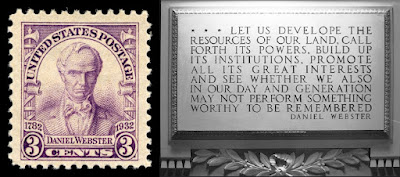Daniel Webster (1782–1852) was an American statesman, lawyer, and orator who played a key role in the early history of the United States. He was born on January 18, 1782, in Salisbury, New Hampshire, and died on October 24, 1852, in Marshfield, Massachusetts.
Webster was a prominent figure in 19th-century American politics and served in various capacities throughout his career. Some key aspects of his life and career include:
Early Life and Education:
- Webster was born into a farming family and attended Dartmouth College, graduating in 1801.
- He then studied law and was admitted to the bar in 1805, starting his legal career in Portsmouth, New Hampshire.
Political Career:
- Webster entered politics and served in the U.S. House of Representatives (1813–1817) and later in the U.S. Senate (1827–1841, 1845–1850).
- He was known for his exceptional oratory skills and played a key role in debates over issues such as tariffs, the national bank, and states' rights.
Great Compromiser:
- Webster earned the nickname "The Great Compromiser" for his efforts to find middle-ground solutions to sectional conflicts, particularly those related to slavery and the preservation of the Union.
- He was involved in several compromise measures, including the Compromise of 1850.
Secretary of State:
- Webster served as the Secretary of State under three presidents: William Henry Harrison, John Tyler, and Millard Fillmore.
- His most notable achievement in this role was negotiating the Webster-Ashburton Treaty with Britain in 1842, which settled border disputes between the United States and Canada.
7th of March Speech:
- In 1850, Webster delivered his famous "Seventh of March Speech" in the Senate, expressing support for the Compromise of 1850 in an effort to preserve the Union.
Legacy:
- Daniel Webster is remembered as one of the most influential and eloquent American statesmen of his time.
- His speeches and writings, particularly on the importance of the Union, continue to be studied for their impact on American political thought.
Daniel Webster's legacy is intertwined with the complex issues and debates of his era, and his contributions to American political and legal history are significant.









